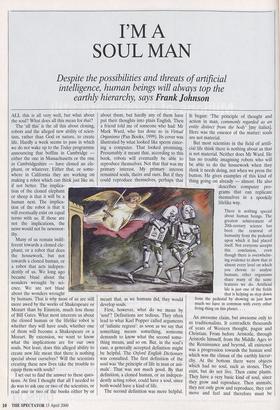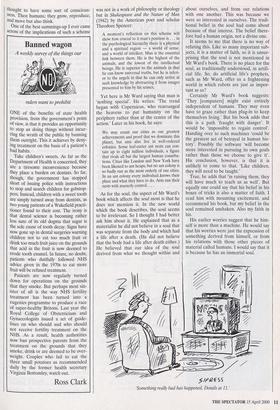I'M A SOUL MAN
Despite the possibilities and threats of artificial intelligence, human beings will always top the
earthly hierarchy, says Frank Johnson ALL this is all very well, but what about the soul? What does all this mean for that?
The 'all this' is the all this about cloning, robots and the alleged new ability of scien- tists, rather than God or nature, to create life. Hardly a week seems to pass in which we do not wake up to the Today programme announcing that boffins in Cambridge — either the one in Massachusetts or the one in Cambridgeshire — have cloned an ele- phant, or whatever. Either that, or some- where in California they are working on making a robot which can think just like us, if not better. The implica- tion of the cloned elephant or sheep is that it will be a human next. The implica- tion of the robot is that it will eventually exist on equal terms with us. If those are not the implications, the news would not be newswor- thy.
Many of us remain indif- ferent towards a cloned ele- phant, or a robot that does the housework, but not towards a cloned human, or a robot that acts indepen- dently of us. We long ago became blasé about the wonders wrought by sci- ence. We are not blasé about the wonders wrought by humans. That is why most of us are still more awed by the works of Shakespeare or Mozart than by Einstein, much less those of Bill Gates. What most interests us about the cloned human or the lifelike robot is whether they will have souls, whether one of them will become a Shakespeare or a Mozart. By extension, we want to know what the implications are for our own souls. Not least, does this alleged ability to create new life mean that there is nothing special about ourselves? Will the scientists creating these new lives take the trouble to equip them with souls?
I set out to find the answer to these ques- tions. At first I thought that all I needed to do was to ask one or two of the scientists, or read one or two of the books either by or about them, but hardly any of them have put their thoughts into plain English. Then a friend told me of someone who had: Mr Mark Ward, who has done so in Virtual Organisms (Pan Books, 1999). Its cover was illustrated by what looked like sperm enter- ing a computer. That looked promising. Presumably it meant that, according to this book, robots will eventually be able to reproduce themselves. Not that that was my primary interest. My primary interest remained souls, theirs and ours. But if they could reproduce themselves, perhaps that meant that, as we humans did, they would develop souls.
First, however, what do we mean by 'soul'? Definitions are tedious. They often lead to what Karl Popper called arguments ' of 'infinite regress': as soon as we say that something means something, someone demands to know what the second some- thing means, and so on. But, in the soul's case, a generally accepted definition might be helpful. The Oxford English Dictionary was consulted. The first definition of the soul was 'the principle of life in man or ani- mals'. That was not much good. By that definition, a cloned human, or an indepen- dently acting robot, could have a soul, since both would have a kind of life.
The second definition was more helpful. It began: 'The principle of thought and action in man, commonly regarded as an entity distinct from the body' [my italics]. Here was the essence of the matter: souls are not material.
But most scientists in the field of artifi- cial life think there is nothing about us that is not material. Neither does Mr Ward. He has no trouble imagining robots who will be able to do the housework when they think it needs doing, not when we press the button. He gives examples of this kind of thing going on already — almost. He also describes computer pro- grams that can replicate themselves in a spookily lifelike way.
There is nothing special about human beings. The greatest achievement of 20th-century science has been the removal of humanity from the pedestal upon which it had placed itself. Not everyone accepts this conclusion, even though there is overwhelm- ing evidence to show that at ahnost every level on which you choose to analyse humans, other organisms share many of the same features we do. Artificial life is just one of the fields that is helping us step down from the pedestal by showing us just how much we have in common with every other living thing on this planet. . . .
An awesome claim, but awesome only to us traditionalists. It contradicts thousands of years of Western thought, pagan and Christian. From before Aristotle, through Aristotle himself, from the Middle Ages to the Renaissance and beyond, all existence was a progression towards the human soul which was the climax of the earthly hierar- chy. At the bottom there were objects which had no soul, such as stones. They exist, but do not live. Then came plants. They have a very basic kind of soul, since they grow and reproduce. Then animals; they not only grow and reproduce, they can move and feel and therefore must be thought to have some sort of conscious- ness. Then humans; they grow, reproduce, and move but also think.
One of the best summings-up I ever came across of the implications of such a scheme was not in a work of philosophy or theology but in Shakespeare and the Nature of Man (1942) by the American poet and scholar Theodore Spencer:
A moment's reflection on this scheme will show how crucial to it man's position is. . . in the psychological hierarchy there is a physical and a spiritual region — a world of sense, and a world of intellect. Man is the essential link between them. He is the highest of the animals, and the lowest of the intellectual beings. He is superior to the animals in that he can know universal truths, but he is inferi- or to the angels in that he can only arrive at such knowledge by abstracting it from images presented to him by his senses.
Yet here is Mr Ward saying that man is 'nothing special'. He writes: 'The trend began with Copernicus, who rearranged the heavens to put humanity on the periphery rather than at the centre of the action.' Later in his book, he says: We may count our cities as our greatest achievements and proof that we dominate this planet, but ants also live in well-ordered colonies. Some leaf-cutter ant nests can con- tain up to eight million individuals, a figure that rivals all but the largest human conurba- tions. Cities like London and New York have been likened to ant heaps, but no ant colony is so badly run as the most orderly of our cities. In an ant colony every individual knows their place and what they have to do. Ants run their nests with masterly control. . . .
As for the soul, the aspect of Mr Ward's book which affects the soul most is that he does not mention it. In the new world which the book describes, the soul seems to be irrelevant. So I thought I had better ask him about it. He explained that as a materialist he did not believe hi a soul that was separate from the body and which had a life after a death. (He did not believe that the body had a life after death either.) He believed that our idea of the soul derived from what we thought within and about ourselves, and from our relations with one another. This was because we were so interested in ourselves. The tradi- tional belief in the soul had come about because of that interest. The belief there- fore had a human origin, not a divine one.
It seems to me that there is no way of refuting this. Like so many important sub- jects, it is a matter of faith, so it is unsur- prising that the soul is not mentioned in Mr Ward's book. There is no place for the soul, as traditionally understood, in artifi- cial life. So, do artificial life's prophets, such as Mr Ward, offer us a frightening world in which robots are just as impor- tant as us?
Certainly Mr Ward's book suggests: 'They [computers} might exist entirely independent of humans. They may even have to graze rather than plug-in to keep themselves living.' But his book adds that this is a path 'fraught with danger'. It would be 'impossible to regain control'. Handing over to such machines 'could be the greatest act of betrayal in human his- tory'. Possibly the software 'will become more interested in pursuing its own goals rather than those we choose to give it'. His conclusion, however, is that it is unlikely to come to that. 'Like children, they will need to be taught.'
True, he adds that 'in raising them, they will have much to teach us as well'. But equally one could say that his belief in his boxes of tricks is also a matter of faith. I read him with mounting excitement, and recommend his book, but my belief in the soul remained unshaken. Also my faith in his.
His earlier worries suggest that he him- self is more than a machine. He would say that his worries were just the expression of something derived from himself, or from his relations with those other pieces of material called humans. I would say that it is because he has an immortal soul.
'Something really bad has happened. Details at 11.'



































































 Previous page
Previous page